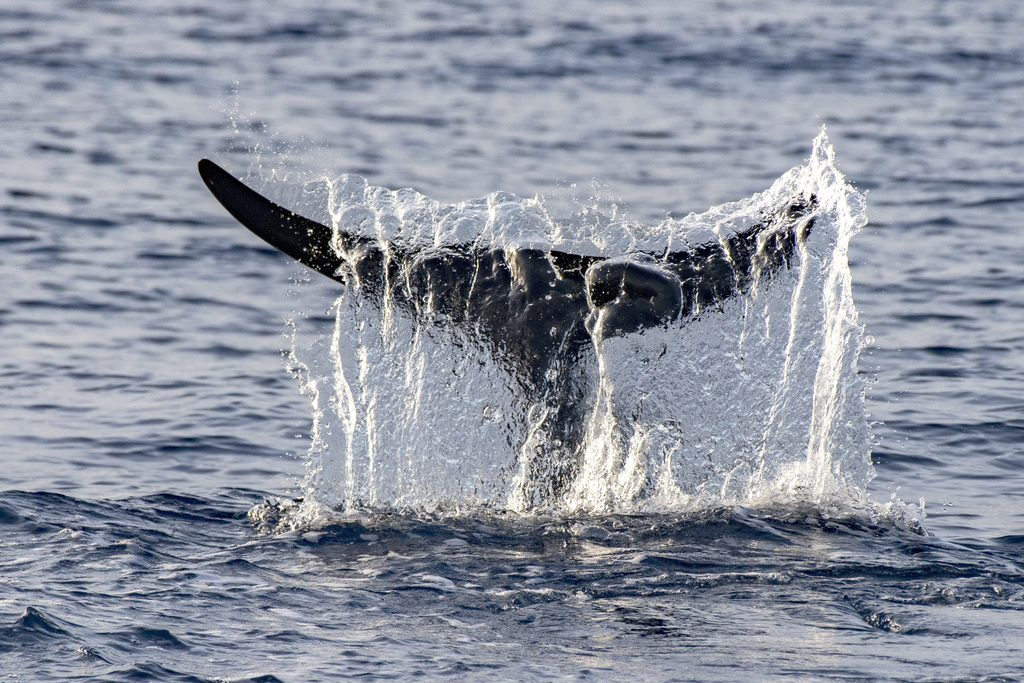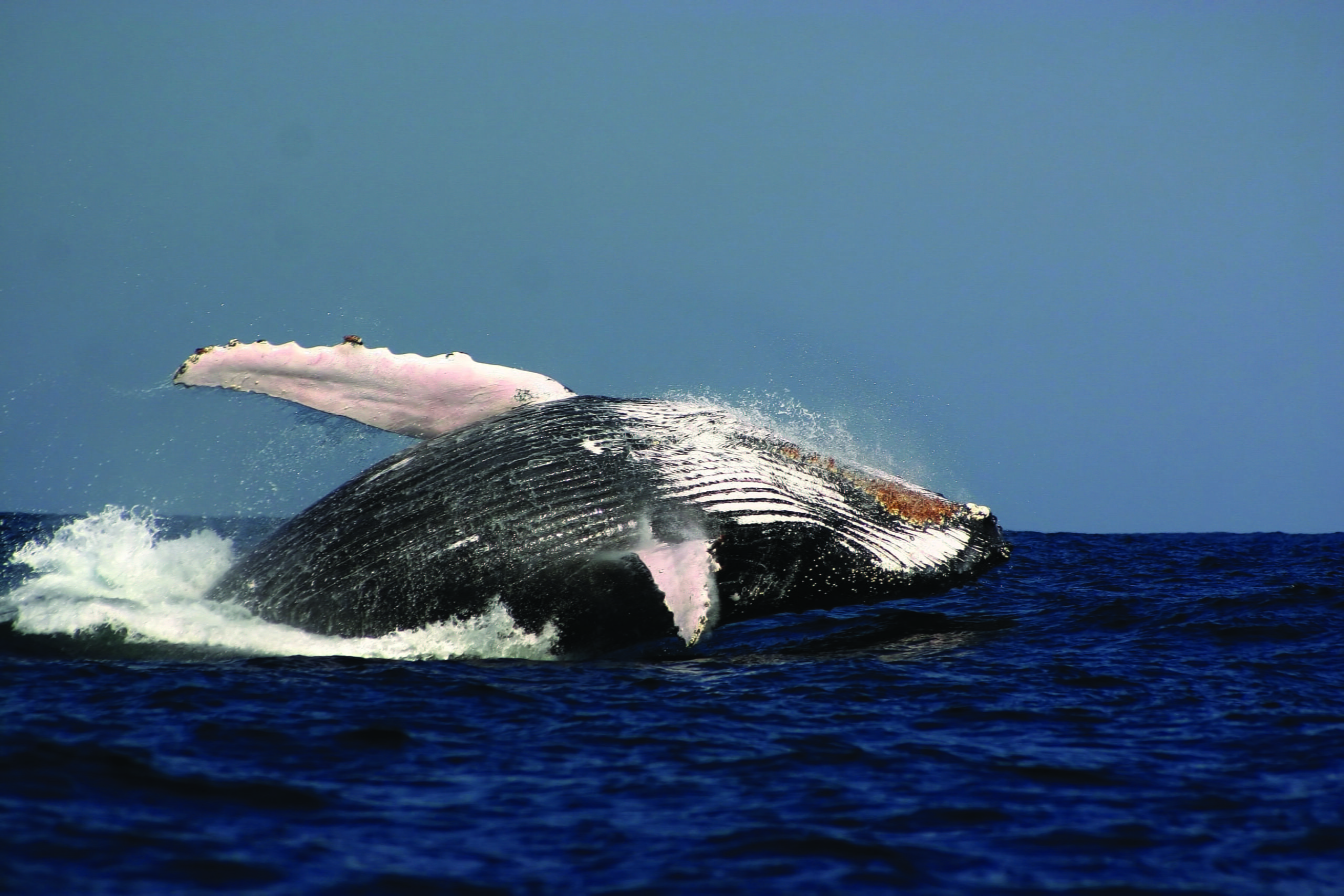Unforgettable sightings on the horizon…
Whale watching has become a beloved pastime globally, especially along KZN’s southern coastline. Loved by locals and enthusiasts worldwide, the region offers exceptional shore-based viewing opportunities.
What is it about witnessing these ocean creatures that leaves such a profound impression on all onlookers? Firstly, the sheer size and majesty of the largest marine mammal known to man is awe-inspiring. They glide gracefully through the water with a grandeur like no other animal. But most of all, they give us a glimpse into the symmetrical magic, rare beauty and indisputable intelligence of their ecosystem. In fact, whales are revered in many indigenous cultures as symbols of wisdom, resilience, and our profound bond with nature. They are often seen as guardians and protectors of Earth’s mysteries.
The south coast of KwaZulu-Natal (KZN), a region nestled along the Indian Ocean, serves as a prime habitat for various whale species during their annual migrations. From mid-May to late November, species including humpback and southern right whales can be spotted along the KZN coastline. These whales undertake long journeys from their feeding grounds in the Antarctic to warmer waters near the equator for breeding and calving.
Whale watching enthusiasts are in the know of vantage points along the coast, perfect for experiencing sightings of these magnificent creatures. Some insider spots for whale watching along the KZN coast include:
Port Edward Whale Watching Tower: A whale watching tower, allowing visitors to enjoy panoramic views of the ocean and spot whales from a higher vantage point.
Margate Whale Deck: A purpose-built deck provides an elevated platform for optimal whale watching opportunities.
Shelly Beach Whale Watching Platform: A designated platform offers unobstructed views of the ocean, perfect for spotting passing whales during the migration season.
Umtentweni Whale Deck: Another deck built by the locals for the community and visitors to enjoy each other’s company while viewing the ocean.
Port Shepstone Lighthouse: A lighthouse offering a scenic setting for whale watching with expansive views of the coastline.
Hibberdene Whale Viewing Point: A designated whale viewing point near the beach, providing a convenient location for spotting whales while enjoying the coastal scenery.
Scottie’s Tea Deck: A deck on the Scottburgh shores offering uninterrupted views of the ocean and a bite to eat.
The whale chasers of the world are significant to tourism in the KZN south coast region, therefore ample opportunities for whale sightings are provided both in restaurant options that boast an ocean view, as well as, seaside roads for slow journeys along the coastline.
With an abundance of opportunities to catch a sighting, you’re guaranteed to get some viewings when embarking on a coastal marine safari, whether you’re the unintentional, dreamy ocean onlooker or the stalwart whale-watcher with binos in hand. So, here are a few things to keep your eye out for:
Water Spouts: Keep watch for subtle disturbances on the water’s surface, indicating the presence of a whale just beneath. These “blows” or exhalations often create small ripples or patches of calm water, providing clues to their whereabouts.
Dorsal Fins: Scan the horizon for the distinctive shape of a whale’s dorsal fin breaking through the surface. These fins can vary in size and shape depending on the species, but they’re usually visible when the whale swims near the surface.
Tail Flukes: Watch for the telltale sign of a whale diving below the surface, indicated by the upward curve of its tail flukes as it prepares to descend. This fleeting glimpse can help anticipate where the whale might resurface.

Bird Activity: Keep an eye on seabirds such as gulls, terns, or shearwaters, as they often gather around areas where whales are feeding. Their aerial movements and sudden dives can lead you to the presence of feeding whales below.
Whale Sounds: Listen attentively for the haunting melodies of whale songs, which can sometimes be heard underwater or even from the surface on calm days. These vocalizations can provide further evidence of nearby whale activity.
Whale sightings can, of course, vary greatly depending on numerous factors, such as the time of year, weather conditions, and individual whale behavior. However, there have been many remarkable whale sightings reported along the KZN south coast over the years.
Some memorable sightings include:
- Rare sightings of blue whales, the largest animals on Earth, occasionally pass through the waters off the KZN coast during their migrations.
- Breaching events, where whales leap out of the water, are always an incredible marvel to witness and can be considered highlights of whale watching experiences.
- Encounters with mother whales and their calves, especially southern right whale mothers, which often seek sheltered bays along the coast to nurse their young.
While specific sightings may stand out to individuals based on their personal experiences, every whale sighting along the KZN south coast offers a unique and unforgettable glimpse into the world of these graceful marine giants.
On the other hand, the prized presence of whales in the local community serves as a reminder of the importance of marine conservation efforts to preserve their natural habitat for future generations to enjoy. Whale watching tourism is a vital sector in the ecotourism industry, particularly along the South Coast. This region has become a magnet for travelers flocking to the breathtaking coastline for unforgettable encounters but also to be a part of the local culture of preservation. The area is rich with ocean lovers and earth protectors who are working together to nurture conservation efforts and align community development with sustainable marine safeguarding.
In South Africa, the rise of whale watching tourism has, in fact, been particularly remarkable, outpacing other forms of tourism in growth rate. This surge not only brings revenue and employment to coastal communities but also serves as a catalyst for inbound tourism.
Beyond economic benefits, responsible whale watching offers invaluable opportunities for education and conservation. By incorporating informative elements into the experience, tourists gain a deeper understanding of marine ecosystems and the importance of preserving them.
As the global demand for responsible and ethical tourism continues to rise, the significance of whale watching as a sustainable and enriching experience cannot be overstated. By harnessing the attraction of marine wildlife, we support the local economies that largely contribute to the conservation of marine ecosystems, ensuring that the magic of whale watching endures for our grandchildren and theirs.
Can you picture yourself on the coastal shores of KZN, with the ocean breeze on your face, gazing out at the horizon, only to witness nature demonstrate its dance with utter beauty in a world so different from our daily reality?
It’s a breathtaking sight that offers a momentary perspective with a lasting impression. One that suggests we broaden the horizons of our psyche to worlds beyond ours so as not to get too deeply embedded in the challenges in our small corner of life. Our human experience is full of uphills and downhills that mirror the rise and fall of the ocean in many ways. A nuance you will surely find in the southern coastal communities of KZN is that time spent observing or exploring the vast blue world that tickles its shores is time spent gracefully lifting above the weight of individual adversity.
As summer fades in the Antarctic and these magnificent creatures journey thousands of kilometers to their breeding grounds near Mozambique, be sure to make your way to the coastline to witness the spectacle of their pilgrimage. Mid-May to late November is the perfect time to pass the shores of KZN and be struck by the raw power and rugged beauty of these marine behemoths. Each sighting, whether it’s a breach or a tail slap, leaves an indelible mark on the heart that will have you joining all avid whale lovers around the globe.

